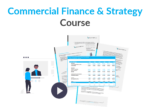
Should I work in Financial Planning & Analysis (FP&A)? – Work-life reality, exposure & exit opportunities
In this mini-series, we explore some of the most talked about Accounting & Audit exit opportunities to uncover what work-life reality is really like, what it can do for your career trajectory & the available exit opportunities. Articles in this mini-series include:
- Should I work in Big 4 Financial Due Diligence (FDD)?
- [THIS ARTICLE] Should I work in Financial Planning & Analysis (FP&A)?
- Should I work in Equity Research?
- Should I work in Big 4 Valuations?
- Should I work in Restructuring?
- Should I work in Product Control?
- Should I work in Internal Audit?
In this article, we’re covering Financial Planning & Analysis (FP&A) – an exit opportunity considered by many as a first step towards more commercial and strategic responsibilities post traditional accounting & audit.
Have you ever wondered:
- What FP&A is actually all about?
- How it might be a step towards more commercial & strategic roles?
- What clients, teams, senior partners etc. will I get exposure to?
- What is the work-life reality like?
Let’s start from the top…
Why does the FP&A team exist?
Every business needs a central team to manage cash flow and drive the budgets, forecasts and analysis of its performance to support strategic decision making.
The information the FP&A team put together helps everyone from junior staff to senior executives of the business visualise the profit/cost trends in their products/services/brands/regions/etc and allow them to steer these in line with market changes in order to allocate their resources for maximum profitability.
Ultimately the management of cash flow, the life blood which ensures the continued success of the business, is in the hands of the FP&A team as the rest of the business rely on them for timely and accurate information.
As the title suggests, you can broadly think of the FP&A responsibilities as split into two categories 1) Forecasting & Budgeting and 2) Analysis of Performance vs Actuals. The usefulness of the latter analysis of course relies on the accuracy of the former planning and divisions across the business will be held to their targets and budgets set in 1).
FP&A is considered a comfortable first step into the commercial finance & strategy realm as it consists of a mix of traditional finance / reporting responsibilities but requires some commercial acumen to perform these tasks.
Whilst you will spend time in excel with large cash flow models and using industry standard financial systems, you will also have a chance to understand what makes a business profitable, spend some time liaising (termed as “Business Partnering”) with different internal stakeholders and contribute somewhat to strategic decision making via the financial reports you produce.
Note that FP&A still sits within the Finance function of a business and is considered a financial reporting role by many employers/recruiters.
Depending on resources and the hierarchy of the company, the FP&A team may be required to get involved in new projects and investments, however if a company also has “Finance Business Partner/Commercial Finance” type roles then these individuals will likely be the ones working more closely with the other divisions within the business (Sales, Marketing, Tech, etc) to make initial plans and help implement these strategic decisions. Any decisions and activities will then feed into the FP&A teams reporting.
Work life reality & client/senior exposure
- To perform both 1) & 2) listed above the FP&A team will need to consider historic company performance, market and economic trends and business partner with internal teams (e.g. the heads of different product, service & customer lines) to understand everything that might influence the company’s future/current activity levels.
- FP&A will normally consist of a small team and depending on the size and hierarchy of the company there may be more than 1 FP&A team responsible for different divisions/regions.
- The lead of the FP&A team will usually report directly into the FD/CFO who are ultimately responsible for the work FP&A produce and the FP&A lead will take charge of collaborating with the FD/CFO in order to present headline forecasts/performance back to the senior executives and business as a whole.
- During the generation of the yearly forecasts and budget will be the busiest time of year as the output determines the business outlook and objectives for the year ahead (sometimes up to 5 years ahead!). Not only does the business produce it’s actions plans on the back of these forecasts and budgets, but vested stakeholders (e.g. where the company is listed or has large private owners) will also be holding the business accountable to these plans.
- To produce the forecasts/budget, each division across the business will report their plans for their own small hemisphere to FP&A who are required to challenge this information (e.g. what’s an acceptable and realistic growth plan, are the forecasts over budget etc) and consolidate this with other divisions.
- With the help of the FD/CFO (who manage the other senior stakeholders expectations) FP&A will then determine the final “shape” of the top level company forecasts & budget (i.e. where costs will be cut, resources allocated and new frontiers explored!) and produce the final figures for the business to use.
- In this role you will also have ongoing reporting duties relating to performance vs forecasts/budget at regular intervals throughout the year (e.g. monthly, quarterly & annually) which will also involve slightly longer working hours but generally not involve pure accounting (i.e. contributing to the preparation of the financial statements) which is more cumbersome. These pure accounting tasks will be covered by a separate core finance team.
This mini-series intended to give you a quick and dirty overview to some of the most talked about Accounting & Audit exit opportunities. This particular post covered Financial Planning & Analysis (FP&A) – a possible step towards more commercial / strategy responsibilities, with other roles coming soon!
Now if this is an area you’re considering, I strongly encourage you to check out our map of the landscape of Accounting & Audit Exit Opportunities, including FP&A to find out:
- How does FP&A compare to other roles in the Finance realm?
- What are my accounting & audit exit opportunities after spending time in FP&A?
- How does the career trajectory in FP&A differ from others I’m considering
- Are there other post-audit career paths suited to me?
- And more…!
Exit Options | Mapping the post-accounting & audit landscape
A lot of the clients we coach ask about moving into more strategic & commercial roles after spending time in traditional accounting & audit, but don’t know where to start or even what opportunities exist …so-much-so that we’ve put together a map of the landscape of accounting exit opportunities, which I encourage you to check out!
Want to land (and master) more strategic and commercial roles?
Learn how to upskill beyond your technical accounting & audit background in the first (and only) online course built specifically for accountants. Through interactive modules, case studies, and real-world applications, you’ll learn how to confidently build financial models, assess business opportunities, and everything else needed to contribute meaningfully to strategic decision-making. Build hard commercial skills to future-proof your skill set and prove you can translate your accounting background into a commercial context with the Commercial Finance & Strategy – Principles and Execution online course.
Spice up your CV/Resume for the post-accounting & audit world
We’ve created a digital guide specifically to help those of you applying for more commercial & strategic roles. Our straight-talking CV/Resume advice for Accountants/Auditors is the only guide that is highly-specific to the traditional accounting & audit background: we give you real-life good & bad examples for showcasing your experience for strategic roles, the best structure & content to win over recruiters, a strategy for distributing your CV/Resume, interview advice, and more!
Want personalised advice from one of our Co-Founders?
We’ve been where you are and can help you forge your swift exit. Click here to Get Coached.











